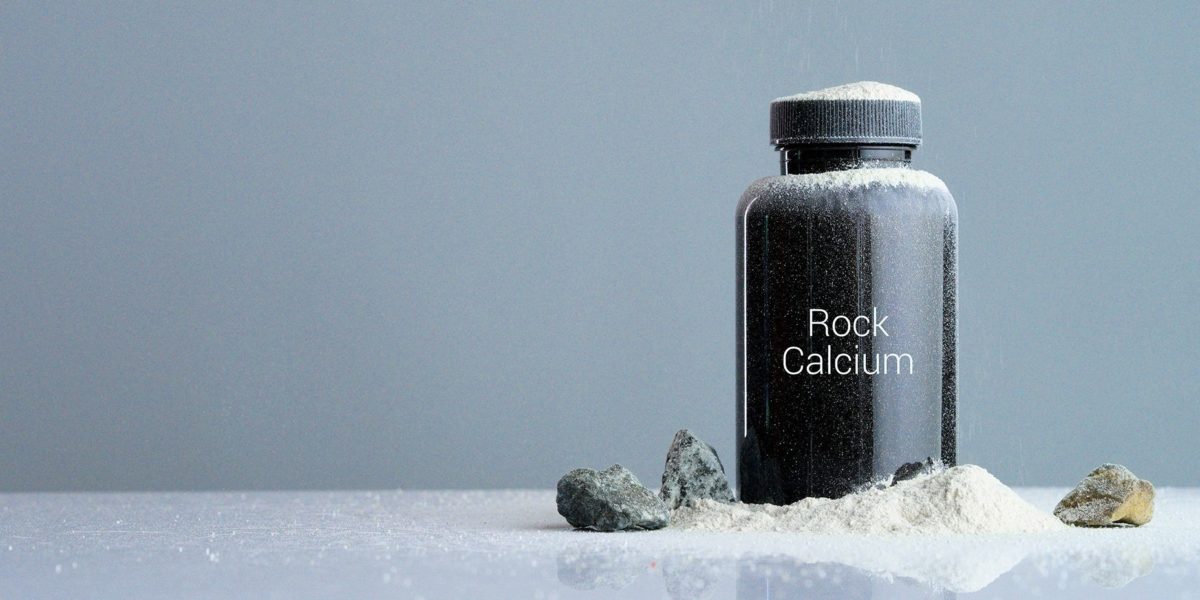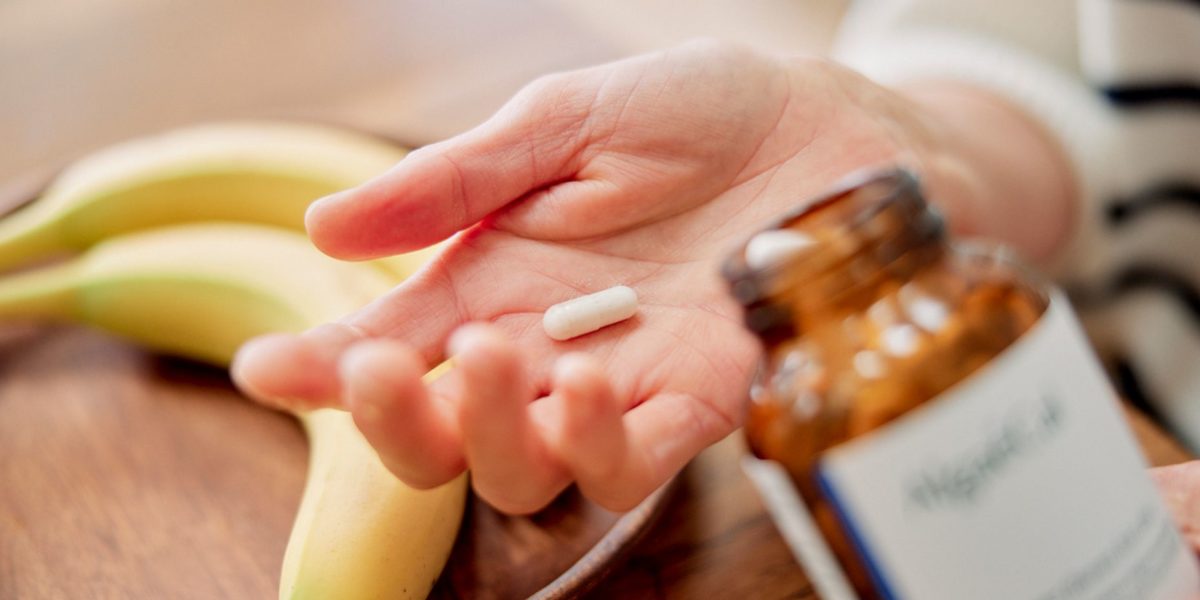Why Calcium Supplements Cause Constipation | Top 8 Causes of Constipation | Too Much Supplemental Rock Calcium | Too Much Supplemental Iron | Too Much Sugar and Unhealthy Fats | Lack of Physical Activity | Imbalanced Gut Bacteria | Certain Medications | Lack of Water | Lack of Magnesium | Natural Remedies for Constipation | Takeaway
So you decided to show your bones some love and treat them to some calcium. But after a week or so of taking calcium supplements you notice your stomach’s cramping like you binged on bad takeout. Oh, and let’s not even get into the gas and bloating. So now maybe you’re wondering, “Does calcium cause constipation?”
If so, you’re not alone. Many women and men ask this question. After all, 43% of the American population uses a calcium supplement.1 So it’s likely that there are plenty of upset tummies out there.
But discomfort aside, these annoying issues are problematic. After all, they can keep you from taking your recommended daily dosage of calcium. Why would you want to feel sick to your stomach, right?
After reading this post, you’ll know how to avoid all these problems and not have to worry about missing your dosing schedule.
Why Do Calcium Supplements Cause Constipation?
Watch the video below or read the transcript here as Lara Pizzorno, Bone Health Expert dives in further to this common question. And don’t forget to continue reading for more insight on how to avoid constipation when taking calcium.
Top 8 Causes of Constipation
1. Too Much Supplemental Rock Calcium
The most common type of calcium and the one that causes the most gastrointestinal discomfort is from rock. It’s described on your label as ‘calcium from calcium carbonate‘ or calcium citrate. This is why rock is used as the main component in antacids like Tums. It works great if you suffer from acid reflux and heartburn – but your digestive system pays the price! If stomach acids aren’t there to churn and break down your food, then it makes sense that constipation, bloating, gas, and cramps will result.
According to a 5-year, double-blind, placebo-controlled study,2 the occurrence of constipation was increased with the use of calcium carbonate (among 1,460 participants, 13.4% of the calcium group experienced constipation; 9.1% of the placebo group experienced constipation).
So why do we eat rock calcium? Because rocks are cheap, rich in calcium (40%)3 and capable of slowing bone loss. See, we naturally lose about 1% of our bone per year after age 35. For decades, rocky calcium carbonate has cut that bone loss down by a little bit.

But that wasn’t without its drawbacks. For instance, in several random control trials4 participants receiving calcium reported higher rates of gastrointestinal issues (GI). These problems were described as:
- constipation
- excessive abdominal cramping
- bloating
- upper GI events
- GI disease
- GI symptoms
- severe diarrhea or abdominal pain
These gastro issues happen because the alkaline calcium carbonate neutralizes your stomach acids. If stomach acids aren’t there to digest your food and improve mineral absorption, then it makes sense that constipation, bloating, gas, and cramps will result.
Then there’s the fact that some people are getting more than their recommended dietary allowance for calcium5 because they aren’t compensating for the calcium they get in their food each day. This can also lead to gastrointestinal issues.
2. Too Much Supplemental Iron
Iron supplements6 are notorious for causing constipation. And that’s why many people don’t follow through with their supplementation.
3. Too Much Sugar and Unhealthy Fats
Consuming too much sugar and/or unhealthy fats feeds unhealthy bacteria in your gut and causes inflammation. And when the intestinal tract swells with inflammation, it’s difficult for food to move through it. Sugar and fats also can displace high fiber foods, leading to constipation.
Tip: Reduce or eliminate foods with added sugar and refined carbohydrates. The same goes for unhealthy fats. Avoid fried foods as much as possible, which also tend to contain refined carbohydrates. Also, swap out unhealthy fats for naturally-occurring healthy fats that have a soothing, inflammation-reducing effect. These can be found in plant-based oils, seeds, nuts and fatty fish.
4. Lack Of Physical Activity
If you ever undergo a medical procedure or end up in the hospital, one of the first things the medical team will do to get you on the mend is help you go for a walk. That’s because we are designed to be on the move and our digestion depends on it.Walking helps move and massage the food in the digestive tract, using gravity to help move it along. Yoga, jogging, Pilates, and the like will all have the same benefits.
They also help strengthen your muscles, including the intestinal tract, giving you greater ability to move things both inside and outside your body.
Tip: Get up and get moving as often as possible. Take a walk after meals and try to take a couple 5-to-10 minute walking breaks during the work day. Prolonged periods of sitting are bad for digestion, mood, and overall health.

5. Imbalanced Gut Bacteria
We all get by with a little help from our friends, including the healthy bacteria that make digestion and proper nutrition possible. Healthy bacteria help break down food to extract maximum nutrition and keep it moving along.
6. Certain Medications
The list of medications that can cause constipation7 is lengthy. But some of the top offenders are opioids, NSAIDs, antihistamines, antacids, blood pressure medications and diuretics.
Tip: Follow your healthcare provider’s instructions relating to your medications, but reach out to get more information and solutions regarding constipation. Eat a healthy, fiber-rich diet full of fruits, vegetables, seeds, nuts, legumes and whole grains. Additionally, exercise regularly, drink plenty of water and get plenty of sleep.
7. Lack of Water
Water is vital for healthy digestion. Dehydration wreaks havoc on the human body, including the digestive tract. When you’re dehydrated, your body will conserve as much water as possible for cerebral fluid, blood volume, and respiration.
8. Lack of Magnesium
Magnesium is needed to relax muscles, including those of the gastrointestinal tract. It’s also needed to properly absorb and utilize calcium and vitamin D. Low magnesium intake8 causes a host of health problems, including constipation, irritability, tense muscles, and sensitivity to noise. About half of the American public is magnesium deficient.
Natural Remedies for Constipation
When it comes to constipation, fiber is your friend. Aim for 25-30 grams of fiber daily by eating fiber-rich foods such as fruits, vegetables, legumes, nuts and whole grains.
Another way to keep your gut happy is to give it a boost of healthy bacteria. Consume probiotic foods such as kefir, yogurt, kimchi, sauerkraut, kombucha and homemade shrubs.

Also, make sure to eat a variety of magnesium-rich foods throughout the day, every day. This includes dark-green vegetables, whole grains, beans, nuts and seeds. As Lara mentioned, calcium and magnesium work together.
If you really want to get things moving, add some kiwi to your diet. It’s been reported that it eases constipation9 as well as prunes and psyllium powder. Plus, it’s better tolerated.
Of course, you know it’s not enough to simply eat healthy foods — you have to avoid eating unhealthy ones too. So reduce or cut fried foods along with foods that have added sugar and refined carbohydrates.
The same goes for unhealthy fats. Swap them out for naturally-occurring healthy fats that have a soothing, inflammation-reducing effect. These can be found in plant-based oils, seeds, nuts and fatty fish.
Remember to drink 8 to 10 glasses of water every day. Avoid sugary drinks and/or those with toxic food additives. Limit caffeine consumption to 2 to 3 cups of caffeinated beverages a day. Additionally, exercise regularly and get plenty of sleep.
Takeaway
Constipation is an unwelcome side-effect. But don’t lose sight of why you started taking a calcium supplement in the first place — bone health.
So don’t give up on taking calcium supplements. Instead, try a natural, plant-based calcium supplement.
It will be much easier on your stomach. And, unlike traditional rock-based calcium supplements, plant-based calcium can make your bones stronger because it contains all the nutrients your bones need.
After all, bone loss isn’t a loss of calcium. It’s a loss of all the minerals in your bones. So if your rock-based calcium supplement contains only calcium, that’s bad news. You’re missing 12 vital bone-supporting minerals.
The best calcium supplement will provide you with all the nutrients your bones need — minus the unwanted side-effects like constipation, gas or bloating!

When looking at calcium supplements, consider these factors:
True Cost: If your calcium supplement is just calcium alone or calcium and vitamin D it is not enough. Your bones are made up of much more than that! They need magnesium, vitamin K2, D3, C, boron, and trace minerals. Buying all of those separately is expensive and a hassle. Instead, get an all-in-one bone formula.
Amount of Calcium: Remember that your body can only absorb 500 mg of calcium at a time. Anything beyond that will make you feel sick to your stomach and lead to constipation. In addition to constipation, too much calcium at once or over time has potential health risks like calcium depositing into soft tissues and kidney stones. AlgaeCal Plus is more effective at a lower dose, compared to higher amounts in other calcium supplements.
Plus, it contains the vitamin K2, which directs calcium straight to your bones and keeps it out of your arteries! And it has magnesium in the proper ratio of 2:1 (2 parts calcium to every part magnesium).
As you’ve now learned, magnesium is a natural laxative — which will balance the constipating effects of calcium. And it also has bone-building properties.
What’s more, the minerals are “pre-digested” by the plant making them more body-friendly! That’s why this rare marine algae can help you stay constipation-free.
FAQs
Can calcium make you constipated?
Yes, some types of calcium can cause constipation due to their impact on stomach acid, and stomach acid’s crucial role in breaking down food. Calcium carbonate, in particular, is an alkaline rock-based calcium supplement that neutralizes your stomach acid and may cause constipation.
How do you avoid constipation when taking calcium?
Getting a balance of calcium through food and supplements, instead of relying solely on supplements, can help reduce calcium-related constipation. Also, ensure you take magnesium, eat enough fiber, and stay hydrated.
Which calcium is best to avoid constipation?
Try a natural, plant-based calcium supplement as opposed to rock-based calcium. Plant-based calcium is easier on your stomach and will naturally contain a matrix of minerals needed for healthy bones.
References
- Regan L Bailey, Kevin W Dodd, Joseph A Goldman, Jaime J Gahche, Johanna T Dwyer, Alanna J Moshfegh, Christopher T Sempos, Mary Frances Picciano. “Estimation of total usual calcium and vitamin D intakes in the United States.” The Journal of Nutrition. (2010) doi: 10.3945/jn.109.118539.
- Kelvin Li, Xia-Fang Wang, Ding-You Li, Yuan-Cheng Chen, Lan-Juan Zhao, Xiao-Gang Liu, Yan-Fang Guo, Jie Shen, Xu Lin, Jeffrey Deng, Rou Zhou, and Hong-Wen Deng. “The good, the bad, and the ugly of calcium supplementation: a review of calcium intake on human health.” Clinical Interventions in Aging. (2018). doi: 10.2147/CIA.S157523
- Douglas C. Bauer, M.D. “Calcium Supplements and Fracture Prevention.” The New England Journal of Medicine. (2014). doi: 10.1056/NEJMcp1210380
- I. R. Reid, S. M. Bristow, M. J. Bolland, “Calcium supplements: benefits and risks.” Journal of Internal Medicine. (2015). doi: 10.1111/joim.12394
- https://ods.od.nih.gov/factsheets/Calcium-HealthProfessional/
- Lindsay H. Allen. “Iron Supplements: Scientific Issues Concerning Efficacy and Implications for Research and Programs.” The Journal of Nutrition, Volume 132, Issue 4, (April 2002), Pages 813S–819S, https://doi.org/10.1093/jn/132.4.813S
- Christopher N Andrews, MD MSc FRCPC1 and Martin Storr, MD. “The pathophysiology of chronic constipation.” Canadian Journal of Gastroenterotology. (2011). https://www.ncbi.nlm.nih.gov/pmc/articles/PMC3206564/
- American Osteopathic Association. “Low magnesium levels make vitamin D ineffective: Up to 50 percent of the US population is magnesium deficient.” ScienceDaily. (2018). www.sciencedaily.com/releases/2018/02/180226122548.htm
- Samuel W Chey, William D Chey, Kenya Jackson, Shanti Eswaran. “Exploratory Comparative Effectiveness Trial of Green Kiwifruit, Psyllium, or Prunes in US Patients With Chronic Constipation.” The American Journal of Gastroenterology (2021). doi: 10.14309/ajg.0000000000001149.






gina richards
June 20, 2013 , 4:00 amThank you for the information. i have been prescribed the powdery chewable tablets that you describe as ‘rock’ for all the years since diagnosis by scan in jan 2006 age 50. i most certainly will try algae cal. also thank you for the dietary info, i will be following a healthier diet from now on. some of your diet plan was already on my weekly agenda, but now i have seen some that i could introduce for variety. much appreciated.